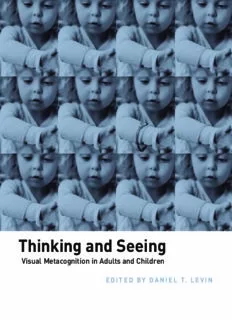
Thinking and Seeing: Visual Metacognition in Adults and Children PDF
Preview Thinking and Seeing: Visual Metacognition in Adults and Children
L E Thinking and Seeing V I N , Visual Metacognition in Adults and Children E D I T O EDITED BY DANIEL T. LEVIN R T Experimental research has shown that people miss apparently obvious visual discontinuities—a phenome- h non known as “change blindness.” For example, in one experiment, subjects watching a brief film of a i conversation between two actors did not notice that in some shots one actor appeared wearing a large, n colorful scarf and in other shots she wore no scarf; in another experiment, subjects did not even notice when k one actor was replaced by another between shots. Moreover, when told what they had missed, many subjects i n were incredulous, and occasionally even insisted that the film they had seen had not included anything g unusual (“change blindness blindness”). This kind of conflict between actual and presumed cognitive a functioning has been analyzed in other areas of metacognition; the contributors to Thinking and Seeing n explore the implications for vision, which have remained largely unexamined. Doing so, they make important d connections among diverse areas in cognitive science and provide a starting point for new research on how S people think about seeing. e Demonstrating the interdisciplinary nature of the work in this field, the contributors draw on developing e theories of mind to explore the foundations of metacognitive understanding in children and metacognition i n errors by adults; on traditional metacognition research to analyze potential connections between research on g problem solving and vision; on research in folk psychology and concepts to examine “the illusion of explana- tory depth” and how systematic our understanding of seeing is; and on an understanding of the relationship between consciousness and cognitive control of ongoing tasks. DANIEL T. LEVINis Associate Professor of Psychology and Human Development at Vanderbilt University. A Bradford Book Dare A. Baldwin Frank C. Keil Lynne M. Reder The MIT Press Thinking and Seeing Melissa R. Beck Arthur F. Kramer Erik D. Reichle Massachusetts Institute of Technology Jane E. Cottrell Daniel T. Levin Leon Rozenblit Cambridge, Massachusetts 02142 Visual Metacognition in Adults and Children http://mitpress.mit.edu Rachel A. Diana John M. Marazita Megan M. Saylor John H. Flavell William E. Merriman Brian J. Scholl Cover Image: © 2004, Getty Images, Inc. EDITED BY DANIEL T. LEVIN Carl E. Granrud Candice M. Mills Jonathan W. Schooler 0-262-62181-9 ,!7IA2G2-gcbibg!:t;K;k;K;k David V. Halpern Heather L. Pringle Daniel J. Simons David E. Irwin Jeffrey J. Rachlinski Gerald A. Winer Thinking and Seeing Thinking and Seeing Visual Metacognition in Adults and Children edited by Daniel T. Levin ABradford Book The MIT Press Cambridge, Massachusetts London, England © 2004 Massachusetts Institute of Technology All rights reserved. No part of this book may be reproduced in any form by any electronic or mechan- ical means (including photocopying, recording, or information storage and retrieval) without per- mission in writing from the publisher. This book was set in Palatino by SNPBest-set Typesetter Ltd., Hong Kong and was printed and bound in the United States of America. Library of Congress Cataloging-in-Publication Data Thinking and seeing : visual metacognition in adults and children / edited by Daniel T. Levin. p. cm. “ABradford book.” Includes bibliographical references and index. ISBN 0-262-12262-6 (hc. : alk. paper)—ISBN 0-262-62181-9 (pbk. : alk. paper) 1. Visual perception—Congresses. 2. Metacognition—Congresses. I. Levin, Daniel T. BF241.T48 2004 152.14—dc22 2003064194 10 9 8 7 6 5 4 3 2 1 Contents Acknowledgments vii Introduction 1 Daniel T. Levin Chapter 1 Development of Knowledge about Vision 13 John H. Flavell Chapter 2 Action Analysis and Change Blindness: Possible Links 37 Megan M. Saylor and Dare A. Baldwin Chapter 3 Young Children’s Awareness of Their Own Lexical Ignorance: Relations to Word Mapping, Memory Processes, and Beliefs about Change Detection 57 William E. Merriman and John M. Marazita Chapter 4 Visual Metacognition and the Development of Size Constancy 75 Carl E. Granrud Chapter 5 The Odd Belief That Rays Exit the Eye during Vision 97 Gerald A. Winer and Jane E. Cottrell Chapter 6 Thinking about Seeing: Spanning the Difference between Metacognitive Failure and Success 121 Daniel T. Levin and Melissa R. Beck Chapter 7 “Change Blindness” Blindness: An Implicit Measure of a Metacognitive Error 145 Brian J. Scholl, Daniel J. Simons, and Daniel T. Levin vi Contents Chapter 8 Individual Differences in the Visual Representation of Scenes 165 Heather L. Pringle, Arthur F. Kramer, and David E. Irwin Chapter 9 Visual versus Verbal Metacognition: Are They Really Different? 187 Rachel A. Diana and Lynne M. Reder Chapter 10 Zoning Out while Reading: Evidence for Dissociations between Experience and Metaconsciousness 203 Jonathan W. Schooler, Erik D. Reichle, and David V. Halpern Chapter 11 What Lies Beneath? Understanding the Limits of Understanding 227 Frank C. Keil, Leonid Rozenblit, and Candice M. Mills Chapter 12 Misunderstanding Ability, Misallocating Responsibility 251 Jeffrey J. Rachlinski About the Contributors 277 Index 283 Acknowledgments I would like to thank Katherine Floody for her invaluable assistance in organiz- ing the Kent Forum on Visual Metacognition and this volume; the Kent State University Applied Psychology Center and its director, Stevan Hobfoll, for under- writing the forum; and The Inn at Honey Run in Millersburg, Ohio, for provid- ing us with a home for the forum. Preparation of this book was supported in part by NSF grant SES-0214969 to Daniel Levin. Thinking and Seeing
Description: